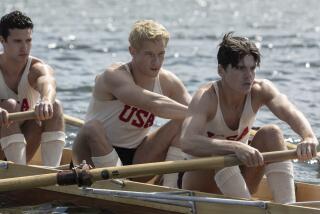Formerly Adrift, Quevedo Finds the Right Course
- Share via
Everyone knows what to do with A students. They’re worshiped and admired. Everyone knows what to do with failing students. They’re given extra attention and scrutiny.
It’s the C students stumbling along doing just enough to get by who are largely ignored, until something happens to capture their imagination.
For Franco Quevedo of Santa Monica, rowing was the impetus to change a path going nowhere.
“It’s given me purpose and focus,” he said. “I just realize anything is possible.”
Last month, Quevedo won the Southwest Regional junior championship in the men’s single sculls for the second consecutive year. He heads for Cincinnati this weekend to compete in the U.S. Rowing junior national championships in the double sculls.
Quevedo’s grade-point average has been hovering below 2.0 because of too many absences and too many missed assignments.
But rowing has become his motivation to attend college.
“I’m pretty sure I can fix the mistakes from high school at the community college level and transfer to a big school,” he said.
Without rowing, Quevedo would be lost.
“Rowing gave me a life,” he said. “I met all my really good friends. I discovered a lot about myself.”
If only Quevedo could transfer his competitive spirit from rowing to the classroom. At 5 feet 11, 170 pounds, he’s considered undersized for a sport that likes its competitors tall, lean and muscular.
“He’s small for a rower, which makes his achievement all the more remarkable,” said Zohar Abramovitz, coach of the Marina Aquatic Center junior rowing program.
Based in Marina del Rey, Abramovitz works with 65 boys and girls age 14 to 18 from 23 schools.
“A lot of them do it because it’s something different,” Abramovitz said. “They come in knowing nothing, and within a few months, they’re doing things physically they never thought imaginable.”
Quevedo tried out for soccer at Santa Monica as a freshman and didn’t make the team. A classmate told him about a club rowing program. He tried it, wasn’t satisfied, came back for a second year and started to thrive.
“You’re in your own little boat going along,” Quevedo said. “It’s unlike any other sport I’ve done. It involves strategy. You mess with people’s heads, pretending you’re tired and take off. Everything [hurts]. You run out of air. Your thighs start throbbing. You keep going.”
Over a 2,000-meter course, the competitors are challenged physically and mentally.
“It’s a tremendously demanding cardiovascular sport,” Abramovitz said.
Quevedo was a surfer used to a laid-back atmosphere, but the strenuous, competitive nature of rowing brought out instincts he never felt before.
“Before rowing, I wasn’t a serious athlete,” he said. “I didn’t really know my athletic capability.”
Quevedo has chosen to compete in the double sculls at the junior nationals with his teammate, Drew Bridges, a senior at Palisades, because that’s the event he believes he has the best chance to medal in.
They’ve been training five days a week in Marina del Rey, snugly fitting into their 24-foot-long boat that is less than a foot wide.
In unison, every stroke looks identical as their seats move back and forth.
Quevedo plans to work as a lifeguard in the summer, then enroll at Orange Coast College, which has the only junior-college rowing program in the nation.
Bridges is headed to Cornell, and many others in the rowing program have excellent academic profiles.
Quevedo knows rowing won’t pay the bills, so he’s going to have to change his study habits.
“I’m going to have to push myself,” he said. “It’s always been hard for me, but I’m going to do it.”*
Eric Sondheimer can be reached at eric.sondheimer@latimes.com.
More to Read
Get our high school sports newsletter
Prep Rally is devoted to the SoCal high school sports experience, bringing you scores, stories and a behind-the-scenes look at what makes prep sports so popular.
You may occasionally receive promotional content from the Los Angeles Times.






